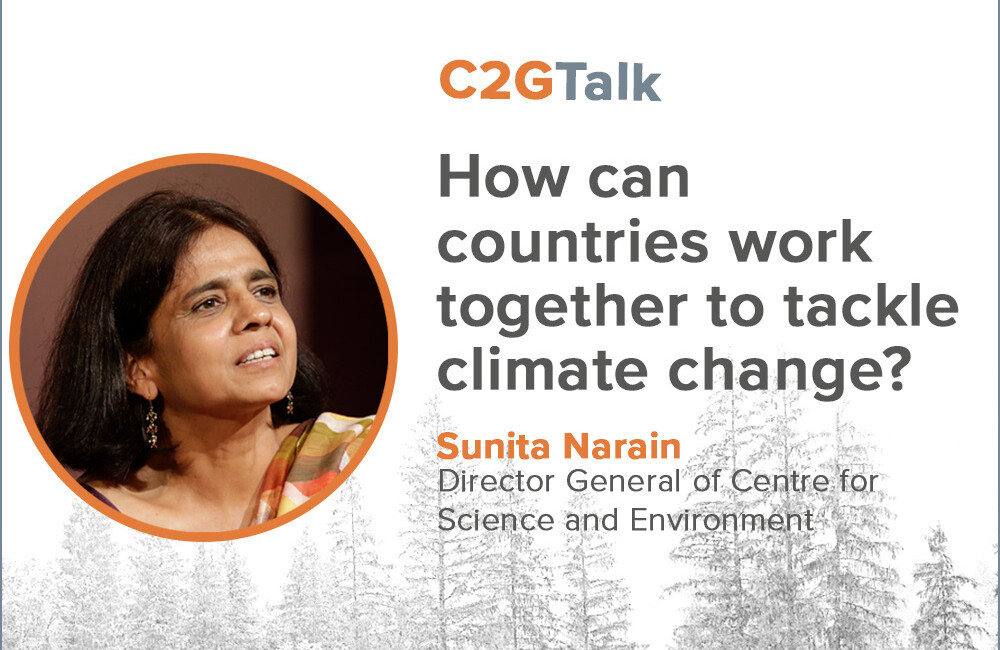C2G publishes conversations with experts in three formats: C2GTalk, C2GDiscuss, and C2GLearn.
C2GTalk is a series of one on one interviews with influential practitioners and thought leaders to explore the governance challenges raised by emerging approaches to alter the climate. Discussions touch on a range of ethical, cultural, economic, and political issues, whilst staying grounded in the practical and personal experiences of our guests.
C2GDiscuss is a series of moderated in-depth conversations between diverse experts on some of the governance challenges of climate-altering approaches. They aim to encourage an engaging conversation about some of the toughest questions faced by decision-makers on climate change, now and in the future.
C2GLearn is a series of online events, designed to catalyze learning about climate-altering approaches and their governance. Featuring leading international experts and practitioners, events include both formal webinars and informal "campfire chats," convened regularly throughout the year, with opportunities for questions and answers.
Recent Episodes

MAY 15, 2023 • Podcast
C2GTalk: Should the Caribbean region be involved in solar radiation modification research? with Michael Taylor
Caribbean countries have led the global push to limit warming to 1.5°C because the impacts of going above that would be so severe for their ...

MAR 27, 2023 • Podcast
C2GTalk: How should policymakers address the risk of climate tipping points? with Jo Tyndall
Climate tipping points are points of no return, beyond which the Earth's systems would reorganize beyond the capacity of socioeconomic and ecological systems to adapt, ...

MAR 13, 2023 • Podcast
C2GTalk: How can companies ensure carbon dioxide removal has a positive impact? with Amy Luers
New thinking is needed to ensure high-quality nature-based carbon dioxide removal offers genuine and long-lasting benefits to the climate and biodiversity, says Microsoft's Amy Luers.

FEB 6, 2023 • Podcast
C2GTalk: How will global warming impact society, both economically and socially? with Paulo Artaxo
Research on solar radiation modification is needed, especially in the Global South, to understand whether it could be an option for reducing climate risk, says ...

DEC 12, 2022 • Podcast
C2GTalk: Why did the Saami Council oppose Harvard's SCoPEx experiment? with Åsa Larsson Blind
In 2021 the Saami Council effectively stopped Harvard University's Stratospheric Controlled Perturbation Experiment (SCoPEx), which aimed to examine the behavior of stratospheric aerosols which could potentially ...

NOV 14, 2022 • Podcast
C2GTalk: What are the challenges facing international governance of solar radiation modification? with Marcos Regis da Silva
The fragmentation of international environmental governance creates challenges for states looking to create governance for solar radiation modification (SRM), says Dr. Marcos Regis da Silva, ...

OCT 30, 2022 • Podcast
C2GTalk: Why is broad-based governance needed for new climate technologies? with Per Heggenes
The world needs to look at every option to stop dangerous climate change, but some potential approaches—like solar radiation modification—are undeveloped and could ...

OCT 17, 2022 • Podcast
C2GTalk: What role might CDR and SRM play in IPCC pathways to achieve the Paris Agreement? with Roberto Schaeffer
In this "C2GTalk," host Mark Turner talks speaks with Federal University of Rio de Janeiro's Dr. Roberto Schaeffer about carbon dioxide removal and solar ...

SEP 26, 2022 • Podcast
C2GTalk: How can countries work together to tackle climate change? with Sunita Narain
Countries need to set aside their differences, recognize their interdependence, and negotiate as equals to tackle the climate crisis, says Sunita Narain, the director general ...

JUN 13, 2022 • Podcast
C2GTalk: How is the UNESCWA supporting Arab states in the green transition? with Rola Dashti
Countries in the Arab region are seeking substitutes to oil so they can diversify their economies and mitigate the impact of fossil fuels production. Rola ...
